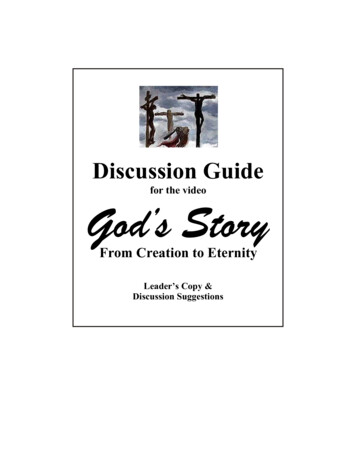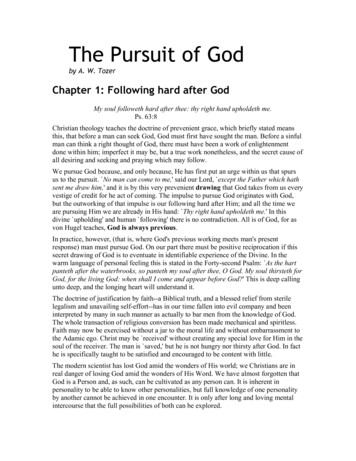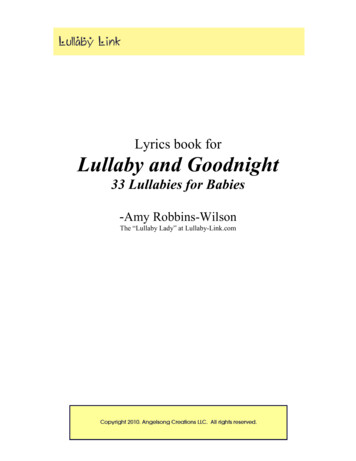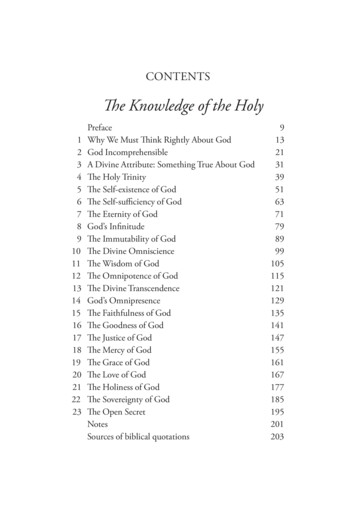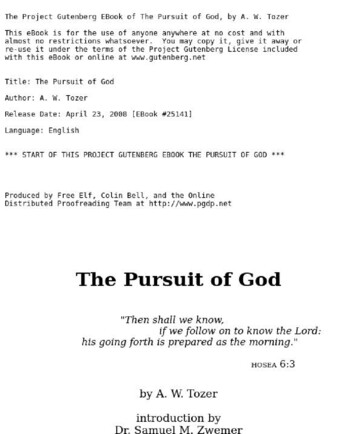
Transcription
The Project Gutenberg EBook of ThePursuit of God, by A. W. TozerThis eBook is for the use of anyoneanywhere at no cost and withalmost no restrictions whatsoever.You may copy it, give it away orre-use it under the terms of theProject Gutenberg License includedwith this eBook or online atwww.gutenberg.netTitle: The Pursuit of GodAuthor: A. W. TozerRelease Date: April 23, 2008 [EBook#25141]Language: English
*** START OF THIS PROJECT GUTENBERGEBOOK THE PURSUIT OF GOD ***Produced by Free Elf, Colin Bell,and the OnlineDistributed Proofreading Team athttp://www.pgdp.netThe Pursuit of God
"Then shall we kif we fhis going forth is preparedby A. W. Tozerintroduction byDr. Samuel M. ZwemerCHRISTIAN PUBLICATIONS,INC. HARRISBURG, PA.
COPYRIGHT MCMXLVIII BYCHRISTIAN PUBLICATIONS,INC.Printed in United States
ContentsIntroductionPrefaceI Following Hard after GodThe Blessedness ofIIPossessing NothingIII Removing the VeilIV Apprehending GodV The Universal PresenceVI The Speaking VoiceVII The Gaze of the Soul5711213349617385
Restoring the Creatorcreature RelationIX Meekness and RestX The Sacrament of LivingVIII99109117
IntroductionHere is a masterly study of the innerlife by a heart thirsting after God,eager to grasp at least the outskirtsof His ways, the abyss of His lovefor sinners, and the height of Hisunapproachable majesty—and it waswritten by a busy pastor in Chicago!Who could imagine David writingthe twenty-third Psalm on SouthHalsted Street, or a medieval mysticfinding inspiration in a small study
on the second floor of a frame houseon that vast, flat checker-board ofendless streetsWhere cross the crowdedways of lifeWhere sound the cries ofrace and clan,In haunts of wretchednessand need,On shadowed threshold darkwith fears,And paths where hide thelures of greed .
But even as Dr. Frank Mason North,of New York, says in his immortalpoem, so Mr. Tozer says in thisbook:Above the noise of selfishstrifeWe hear Thy voice, O Son ofMan.My acquaintance with the author islimited to brief visits and lovingfellowship in his church. There Idiscovered a self-made scholar, anomnivorousreaderwitha
remarkable library of theological anddevotional books, and one whoseemed to burn the midnight oil inpursuit of God. His book is the resultof long meditation and much prayer.It is not a collection of sermons. Itdoes not deal with the pulpit and thepew but with the soul athirst forGod. The chapters could besummarized in Moses' prayer,"Show me thy glory," or Paul'sexclamation, "O the depth of theriches both of the wisdom andknowledge of God!" It is theologynot of the head but of the heart.
There is deep insight, sobriety ofstyle, and a catholicity of outlookthat is refreshing. The author hasfew quotations but he knows thesaints and mystics of the centuries—Augustine, Nicholas of Cusa,Thomas à Kempis, von Hügel,Finney, Wesley and many more. Theten chapters are heart searching andthe prayers at the close of each arefor closet, not pulpit. I felt thenearness of God while reading them.Here is a book for every pastor,missionary, and devout Christian. It
deals with the deep things of Godand the riches of His grace. Aboveall, it has the keynote of sincerityand humility.Samuel M. ZwemerNew York City
PrefaceIn this hour of all-but-universaldarkness one cheering gleamappears: within the fold ofconservative Christianity there are tobe found increasing numbers ofpersons whose religious lives aremarked by a growing hunger afterGod Himself. They are eager forspiritual realities and will not be putoff with words, nor will they becontent with correct "interpretations"
of truth. They are athirst for God,and they will not be satisfied till theyhave drunk deep at the Fountain ofLiving Water.This is the only real harbinger ofrevival which I have been able todetect anywhere on the religioushorizon. It may be the cloud the sizeof a man's hand for which a fewsaints here and there have beenlooking. It can result in aresurrection of life for many soulsand a recapture of that radiantwonder which should accompany
faith in Christ, that wonder whichhas all but fled the Church of God inour day.But this hunger must be recognizedby our religious leaders. Currentevangelicalism has (to change thefigure) laid the altar and divided thesacrifice into parts, but now seemssatisfied to count the stones andrearrange the pieces with never acare that there is not a sign of fireupon the top of lofty Carmel. ButGod be thanked that there are a fewwho care. They are those who, while
they love the altar and delight in thesacrifice, are yet unable to reconcilethemselves to the continued absenceof fire. They desire God above all.They are athirst to taste forthemselves the "piercing sweetness"of the love of Christ about Whom allthe holy prophets did write and thepsalmists did sing.There is today no lack of Bibleteachers to set forth correctly theprinciples of the doctrines of Christ,but too many of these seem satisfiedto teach the fundamentals of the faith
year after year, strangely unawarethat there is in their ministry nomanifest Presence, nor anythingunusual in their personal lives. Theyminister constantly to believers whofeel within their breasts a longingwhich their teaching simply does notsatisfy.I trust I speak in charity, but the lackin our pulpits is real. Milton'sterrible sentence applies to our dayas accurately as it did to his: "Thehungry sheep look up, and are notfed." It is a solemn thing, and no
small scandal in the Kingdom, to seeGod's children starving whileactually seated at the Father's table.The truth of Wesley's words isestablished before our eyes:"Orthodoxy, or right opinion, is, atbest, a very slender part of religion.Though right tempers cannot subsistwithout right opinions, yet rightopinions may subsist without righttempers. There may be a rightopinion of God without either loveor one right temper toward Him.Satan is a proof of this."
Thanks to our splendid Biblesocieties and to other effectiveagencies for the dissemination of theWord, there are today many millionsof people who hold "right opinions,"probably more than ever before inthe history of the Church. Yet Iwonder if there was ever a timewhen true spiritual worship was at alower ebb. To great sections of theChurch the art of worship has beenlost entirely, and in its place hascome that strange and foreign thingcalled the "program." This word hasbeen borrowed from the stage and
applied with sad wisdom to the typeof public service which now passesfor worship among us.Sound Bible exposition is animperative must in the Church of theLiving God. Without it no churchcan be a New Testament church inany strict meaning of that term. Butexposition may be carried on in suchway as to leave the hearers devoid ofany true spiritual nourishmentwhatever. For it is not mere wordsthat nourish the soul, but GodHimself, and unless and until the
hearers find God in personalexperience they are not the better forhaving heard the truth. The Bible isnot an end in itself, but a means tobring men to an intimate andsatisfying knowledge of God, thatthey may enter into Him, that theymay delight in His Presence, maytaste and know the inner sweetnessof the very God Himself in the coreand center of their hearts.This book is a modest attempt to aidGod's hungry children so to findHim. Nothing here is new except in
the sense that it is a discovery whichmy own heart has made of spiritualrealities most delightful andwonderful to me. Others before mehave gone much farther into theseholy mysteries than I have done, butif my fire is not large it is yet real,and there may be those who canlight their candle at its flame.A. W. TozerChicago, Ill.June 16, 1948
I Following Hard afterGodMy soul followeth hard afterthee: thy right hand upholdethme.—Psa. 63:8Christian theology teaches thedoctrine of prevenient grace, whichbriefly stated means this, that beforea man can seek God, God must firsthave sought the man.Before a sinful man can think a right
thought of God, there must havebeen a work of enlightenment donewithin him; imperfect it may be, buta true work nonetheless, and thesecret cause of all desiring andseeking and praying which mayfollow.We pursue God because, and onlybecause, He has first put an urgewithin us that spurs us to the pursuit."No man can come to me," said ourLord, "except the Father which hathsent me draw him," and it is by thisvery prevenient drawing that God
takes from us every vestige of creditfor the act of coming. The impulse topursue God originates with God, butthe outworking of that impulse is ourfollowing hard after Him; and all thetime we are pursuing Him we arealready in His hand: "Thy right handupholdeth me."In this divine "upholding" andhuman "following" there is nocontradiction. All is of God, for asvon Hügel teaches, God is alwaysprevious. In practice, however, (thatis, where God's previous working
meets man's present response) manmust pursue God. On our part theremust be positive reciprocation if thissecret drawing of God is toeventuate in identifiable experienceof the Divine. In the warm languageof personal feeling this is stated inthe Forty-second Psalm: "As the hartpanteth after the water brooks, sopanteth my soul after thee, O God.My soul thirsteth for God, for theliving God: when shall I come andappear before God?" This is deepcalling unto deep, and the longingheart will understand it.
The doctrine of justification by faith—a Biblical truth, and a blessedrelief from sterile legalism andunavailing self-effort—has in ourtime fallen into evil company andbeen interpreted by many in suchmanner as actually to bar men fromthe knowledge of God. The wholetransaction of religious conversionhas been made mechanical andspiritless. Faith may now beexercised without a jar to the morallife and without embarrassment tothe Adamic ego. Christ may be"received" without creating any
special love for Him in the soul ofthe receiver. The man is "saved," buthe is not hungry nor thirsty afterGod. In fact he is specifically taughtto be satisfied and encouraged to becontent with little.The modern scientist has lost Godamid the wonders of His world; weChristians are in real danger oflosing God amid the wonders of HisWord. We have almost forgotten thatGod is a Person and, as such, can becultivated as any person can. It isinherent in personality to be able to
know other personalities, but fullknowledge of one personality byanother cannot be achieved in oneencounter. It is only after long andloving mental intercourse that thefull possibilities of both can beexplored.All social intercourse betweenhuman beings is a response ofpersonality to personality, gradingupward from the most casual brushbetween man and man to the fullest,most intimate communion of whichthe human soul is capable. Religion,
so far as it is genuine, is in essencethe response of created personalitiesto the Creating Personality, God."This is life eternal, that they mightknow thee the only true God, andJesus Christ, whom thou hast sent."God is a Person, and in the deep ofHis mighty nature He thinks, wills,enjoys, feels, loves, desires andsuffers as any other person may. Inmaking Himself known to us Hestays by the familiar pattern ofpersonality. He communicates withus through the avenues of our minds,
our wills and our emotions. Thecontinuousandunembarrassedinterchange of love and thoughtbetween God and the soul of theredeemed man is the throbbing heartof New Testament religion.This intercourse between God andthe soul is known to us in consciouspersonal awareness. It is personal:that is, it does not come through thebody of believers, as such, but isknown to the individual, and to thebody through the individuals whichcompose it. And it is conscious: that
is, it does not stay below thethreshold of consciousness and workthere unknown to the soul (as, forinstance, infant baptism is thoughtby some to do), but comes within thefield of awareness where the mancan "know" it as he knows any otherfact of experience.You and I are in little (our sinsexcepted) what God is in large.Being made in His image we havewithin us the capacity to know Him.In our sins we lack only the power.The moment the Spirit has
quickened us to life in regenerationour whole being senses its kinship toGod and leaps up in joyousrecognition. That is the heavenlybirth without which we cannot seethe Kingdom of God. It is, however,not an end but an inception, for nowbegins the glorious pursuit, theheart's happy exploration of theinfinite riches of the Godhead. Thatis where we begin, I say, but wherewe stop no man has yet discovered,for there is in the awful andmysterious depths of the Triune Godneither limit nor end.
Shoreless Ocean, who cansound Thee?Thine own eternity is roundThee,Majesty divine!To have found God and still topursue Him is the soul's paradox oflove, scorned indeed by the tooeasily-satisfiedreligionist,butjustified in happy experience by thechildren of the burning heart. St.Bernard stated this holy paradox in amusical quatrain that will beinstantly understood by every
worshipping soul:We taste Thee, O Thou LivingBread,And long to feast upon Theestill:We drink of Thee, theFountainheadAnd thirst our souls fromThee to fill.Come near to the holy men andwomen of the past and you will soonfeel the heat of their desire afterGod. They mourned for Him, they
prayed and wrestled and sought forHim day and night, in season andout, and when they had found Himthe finding was all the sweeter forthe long seeking. Moses used thefact that he knew God as anargument for knowing Him better."Now, therefore, I pray thee, if Ihave found grace in thy sight, showme now thy way, that I may knowthee, that I may find grace in thysight"; and from there he rose tomake the daring request, "I beseechthee, show me thy glory." God wasfrankly pleased by this display of
ardor, and the next day called Mosesinto the mount, and there in solemnprocession made all His glory passbefore him.David's life was a torrent of spiritualdesire, and his psalms ring with thecry of the seeker and the glad shoutof the finder. Paul confessed themainspring of his life to be hisburning desire after Christ. "That Imay know Him," was the goal of hisheart, and to this he sacrificedeverything. "Yea doubtless, and Icount all things but loss for the
excellency of the knowledge ofChrist Jesus my Lord: for whom Ihave suffered the loss of all things,and do count them but refuse, that Imay win Christ."Hymnody is sweet with the longingafter God, the God whom, while thesinger seeks, he knows he hasalready found. "His track I see andI'll pursue," sang our fathers only ashort generation ago, but that song isheard no more in the greatcongregation. How tragic that we inthis dark day have had our seeking
done for us by our teachers.Everything is made to center uponthe initial act of "accepting" Christ(a term, incidentally, which is notfound in the Bible) and we are notexpected thereafter to crave anyfurther revelation of God to oursouls. We have been snared in thecoils of a spurious logic whichinsists that if we have found Him weneed no more seek Him. This is setbefore us as the last word inorthodoxy, and it is taken for grantedthat no Bible-taught Christian everbelieved otherwise. Thus the whole
testimony of the worshipping,seeking, singing Church on thatsubject is crisply set aside. Theexperiential heart-theology of agrand army of fragrant saints isrejected in favor of a smuginterpretation of Scripture whichwould certainly have soundedstrange to an Augustine, aRutherford or a Brainerd.In the midst of this great chill thereare some, I rejoice to acknowledge,who will not be content with shallowlogic. They will admit the force of
the argument, and then turn awaywith tears to hunt some lonely placeand pray, "O God, show me thyglory." They want to taste, to touchwith their hearts, to see with theirinner eyes the wonder that is God.I want deliberately to encourage thismighty longing after God. The lackof it has brought us to our presentlow estate. The stiff and woodenquality about our religious lives is aresult of our lack of holy desire.Complacency is a deadly foe of allspiritual growth. Acute desire must
be present or there will be nomanifestation of Christ to Hispeople. He waits to be wanted. Toobad that with many of us He waits solong, so very long, in vain.Everyagehasitsowncharacteristics. Right now we are inan age of religious complexity. Thesimplicity which is in Christ is rarelyfound among us. In its stead areprograms, methods, organizationsand a world of nervous activitieswhich occupy time and attention butcan never satisfy the longing of the
heart. The shallowness of our innerexperience, the hollowness of ourworship, and that servile imitation ofthe world which marks ourpromotional methods all testify thatwe, in this day, know God onlyimperfectly, and the peace of Godscarcely at all.If we would find God amid all thereligious externals we must firstdetermine to find Him, and thenproceed in the way of simplicity.Now as always God discoversHimself to "babes" and hides
Himself in thick darkness from thewise and the prudent. We mustsimplify our approach to Him. Wemust strip down to essentials (andthey will be found to be blessedlyfew). We must put away all effort toimpress, and come with the guilelesscandor of childhood. If we do this,without doubt God will quicklyrespond.When religion has said its last word,there is little that we need other thanGod Himself. The evil habit ofseekingGod-andeffectively
prevents us from finding God in fullrevelation. In the "and" lies our greatwoe. If we omit the "and" we shallsoon find God, and in Him we shallfind that for which we have all ourlives been secretly longing.We need not fear that in seeking Godonly we may narrow our lives orrestrict the motions of our expandinghearts. The opposite is true. We canwell afford to make God our All, toconcentrate, to sacrifice the many forthe One.The author of the quaint old English
classic, The Cloud of Unknowing,teaches us how to do this. "Lift upthine heart unto God with a meekstirring of love; and mean Himself,and none of His goods. And thereto,look thee loath to think on aught butGod Himself. So that nought work inthy wit, nor in thy will, but only GodHimself. This is the work of the soulthat most pleaseth God."Again, he recommends that in prayerwe practice a further stripping downof everything, even of our theology."For it sufficeth enough, a naked
intent direct unto God without anyother cause than Himself." Yetunderneath all his thinking lay thebroad foundation of New Testamenttruth, for he explains that by"Himself" he means "God that madethee, and bought thee, and thatgraciously called thee to thy degree."And he is all for simplicity: If wewould have religion "lapped andfolden in one word, for that thoushouldst have better hold thereupon,take thee but a little word of onesyllable: for so it is better than oftwo, for even the shorter it is the
better it accordeth with the work ofthe Spirit. And such a word is thisword GOD or this word LOVE."When the Lord divided Canaanamong the tribes of Israel Levireceived no share of the land. Godsaid to him simply, "I am thy partand thine inheritance," and by thosewords made him richer than all hisbrethren, richer than all the kingsand rajas who have ever lived in theworld. And there is a spiritualprinciple here, a principle still validfor every priest of the Most High
God.The man who has God for histreasure has all things in One. Manyordinary treasures may be deniedhim, or if he is allowed to havethem, the enjoyment of them will beso tempered that they will never benecessary to his happiness. Or if hemust see them go, one after one, hewill scarcely feel a sense of loss, forhaving the Source of all things hehas in One all satisfaction, allpleasure, all delight. Whatever hemay lose he has actually lost
nothing, for he now has it all in One,and he has it purely, legitimately andforever.O God, I have tasted Thy goodness,and it has both satisfied me andmade me thirsty for more. I ampainfully conscious of my need offurther grace. I am ashamed of mylack of desire. O God, the TriuneGod, I want to want Thee; I long tobe filled with longing; I thirst to bemade more thirsty still. Show me Thyglory, I pray Thee, that so I mayknow Thee indeed. Begin in mercy a
new work of love within me. Say tomy soul, "Rise up, my love, my fairone, and come away." Then give megrace to rise and follow Thee upfrom this misty lowland where I havewandered so long. In Jesus' Name,Amen.
II The Blessedness ofPossessing NothingBlessed are the poor in spirit:for theirs is the kingdom ofheaven.—Matt. 5:3Before the Lord God made manupon the earth He first prepared forhim by creating a world of usefuland pleasant things for hissustenance and delight. In theGenesis account of the creation these
are called simply "things." Theywere made for man's uses, but theywere meant always to be external tothe man and subservient to him. Inthe deep heart of the man was ashrine where none but God wasworthy to come. Within him wasGod; without, a thousand gifts whichGod had showered upon him.But sin has introduced complicationsand has made those very gifts ofGod a potential source of ruin to thesoul.Our woes began when God was
forced out of His central shrine and"things" were allowed to enter.Within the human heart "things"have taken over. Men have now bynature no peace within their hearts,for God is crowned there no longer,but there in the moral dusk stubbornand aggressive usurpers fight amongthemselves for first place on thethrone.This is not a mere metaphor, but anaccurate analysis of our real spiritualtrouble. There is within the humanheart a tough fibrous root of fallen
life whose nature is to possess,always to possess. It covets "things"with a deep and fierce passion. Thepronouns "my" and "mine" lookinnocent enough in print, but theirconstant and universal use issignificant. They express the realnature of the old Adamic man betterthan a thousand volumes of theologycould do. They are verbal symptomsof our deep disease. The roots of ourhearts have grown down into things,and we dare not pull up one rootletlest we die. Things have becomenecessary to us, a development never
originally intended. God's gifts nowtake the place of God, and the wholecourse of nature is upset by themonstrous substitution.Our Lord referred to this tyranny ofthings when He said to His disciples,"If any man will come after me, lethim deny himself, and take up hiscross, and follow me. For whosoeverwill save his life shall lose it: andwhosoever shall lose his life for mysake shall find it."Breaking this truth into fragmentsfor our better understanding, it
would seem that there is within eachof us an enemy which we tolerate atour peril. Jesus called it "life" and"self," or as we would say, the selflife. Its chief characteristic is itspossessiveness: the words "gain" and"profit" suggest this. To allow thisenemy to live is in the end to loseeverything. To repudiate it and giveup all for Christ's sake is to losenothing at last, but to preserveeverything unto life eternal. Andpossibly also a hint is given here asto the only effective way to destroythis foe: it is by the Cross. "Let him
take up his cross and follow me."The way to deeper knowledge ofGod is through the lonely valleys ofsoul poverty and abnegation of allthings. The blessed ones whopossess the Kingdom are they whohave repudiated every external thingand have rooted from their hearts allsense of possessing. These are the"poor in spirit." They have reachedan inward state paralleling theoutward circumstances of thecommon beggar in the streets ofJerusalem; that is what the word
"poor" as Christ used it actuallymeans. These blessed poor are nolonger slaves to the tyranny ofthings. They have broken the yokeof the oppressor; and this they havedone not by fighting but bysurrendering. Though free from allsense of possessing, they yet possessall things. "Theirs is the kingdom ofheaven."Let me exhort you to take thisseriously. It is not to be understoodas mere Bible teaching to be storedaway in the mind along with an inert
mass of other doctrines. It is amarker on the road to greenerpastures, a path chiseled against thesteep sides of the mount of God. Wedare not try to by-pass it if we wouldfollow on in this holy pursuit. Wemust ascend a step at a time. If werefuse one step we bring ourprogress to an end.As is frequently true, this NewTestament principle of spiritual lifefinds its best illustration in the OldTestament. In the story of Abrahamand Isaac we have a dramatic picture
of the surrendered life as well as anexcellent commentary on the firstBeatitude.Abraham was old when Isaac wasborn, old enough indeed to havebeen his grandfather, and the childbecame at once the delight and idolof his heart. From that moment whenhe first stooped to take the tiny formawkwardly in his arms he was aneager love slave of his son. Godwent out of His way to comment onthe strength of this affection. And itis not hard to understand. The baby
represented everything sacred to hisfather's heart: the promises of God,the covenants, the hopes of the yearsand the long messianic dream. As hewatched him grow from babyhood toyoung manhood the heart of the oldman was knit closer and closer withthe life of his son, till at last therelationship bordered upon theperilous. It was then that Godstepped in to save both father andson from the consequences of anuncleansed love."Take now thy son," said God to
Abraham, "thine only son Isaac,whom thou lovest, and get thee intothe land of Moriah; and offer himthere for a burnt-offering upon oneof the mountains which I will tellthee of." The sacred writer spares usa close-up of the agony that night onthe slopes near Beersheba when theaged man had it out with his God,but respectful imagination may viewin awe the bent form and convulsivewrestling alone under the stars.Possibly not again until a Greaterthan Abraham wrestled in theGarden of Gethsemane did such
mortal pain visit a human soul. Ifonly the man himself might havebeen allowed to die. That wouldhave been easier a thousand times,for he was old now, and to die wouldhave been no great ordeal for onewho had walked so long with God.Besides, it would have been a lastsweet pleasure to let his dimmingvision rest upon the figure of hisstalwart son who would live to carryon the Abrahamic line and fulfill inhimself the promises of God madelong before in Ur of the Chaldees.
How should he slay the lad! Even ifhe could get the consent of hiswounded and protesting heart, howcould he reconcile the act with thepromise, "In Isaac shall thy seed becalled"? This was Abraham's trial byfire, and he did not fail in thecrucible. While the stars still shonelike sharp white points above thetent where the sleeping Isaac lay, andlong before the gray dawn had begunto lighten the east, the old saint hadmade up his mind. He would offerhis son as God had directed him todo, and then trust God to raise him
from the dead. This, says the writerto the Hebrews, was the solution hisaching heart found sometime in thedark night, and he rose "early in themorning" to carry out the plan. It isbeautiful to see that, while he erredas to God's method, he had correctlysensed the secret of His great heart.And the solution accords well withthe New Testament Scripture,"Whosoever will lose for my sakeshall find."God let the suffering old man gothrough with it up to the point where
He knew there would be no retreat,and then forbade him to lay a handupon the boy. To the wonderingpatriarch He now says in effect, "It'sall right, Abraham. I never intendedthat you should actually slay the lad.I only wanted to remove him fromthe temple of your heart that I mightreign unchallenged there. I wanted tocorrect the perversion that existed inyour love. Now you may have theboy, sound and well. Take him andgo back to your tent. Now I knowthat thou fearest God, seeing thatthou hast not withheld thy son, thine
only son, from me."Then heaven opened and a voice washeard saying to him, "By myselfhave I sworn, saith the Lord, forbecause thou hast done this thing,and hast not withheld thy son, thineonly son: that in blessing I will blessthee, and in multiplying I willmultiply thy seed as the stars of theheaven, and as the sand which isupon the sea shore; and thy seedshall possess the gate of his enemies;and in thy seed shall all the nationsof the earth be blessed; because thou
hast obeyed my voice."The old man of God lifted his headto respond to the Voice, and stoodthere on the mount strong and pureand grand, a man marked out by theLord for special treatment, a friendand favorite of the Most High. Nowhe was a man wholly surrendered, aman utterly obedient, a man whopossessednothing.Hehadconcentrated his all in the person ofhis dear son, and God had taken itfrom him. God could have begun outon the margin of Abraham's life and
worked inward to the center; Hechose rather to cut quickly to theheart and have it over in one sharpact of separation. In dealing thus Hepracticed an economy of means andtime. It hurt cruelly, but it waseffective.I have said that Abraham possessednothing. Yet was not this poor manrich? Everything he had ownedbefore was his still to enjoy: sheep,camels, herds, and goods of everysort. He had also his wife and hisfriends, and best of all he had his son
Isaac safe by his side. He hadeverything, but he possessednothing. There is the spiritual secret.There is the sweet theology of theheart which can be learned only inthe school of renunciation. Thebooks on systematic theologyoverlook this, but the wise willunderstand.After that bitter and blessedexperience I think the wor
Pursuit of God, by A. W. Tozer This eBook is for the use of anyone anywhere at no cost and with almost no restrictions whatsoever. You may copy it, give it away or re-use it under the terms of the Project Gutenberg License included with this eBook or online at www.gutenberg.net Title: The Pursuit of God Author: A. W. Tozer Release Date: April .


